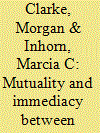|
|
|
Sort Order |
|
|
|
Items / Page
|
|
|
|
|
|
|
| Srl | Item |
| 1 |
ID:
159817


|
|
|
|
|
| Summary/Abstract |
In the introduction to this special issue, we make the case for ‘de-centring’ the study of Shiʿi Islam, conceptually, spatially and sociologically. After first noting the essentialization of Shiʿi identity within the contemporary public sphere, we question its spatialization within the modern world of nation-states and area studies, and contrast the physical and human geography of Shiʿi Islam. We then turn to the central theme of religious authority. Much of the study of modern Shiʿi Islam has (legitimately) focused on towering clerical figures and the institution of the marjaʿiyya, the summit of the religious hierarchy. We propose a number of ways in which this focus on the marjaʿiyya might be complicated, through attention to the diversity of forms it takes and the ways in which it is mediated. We point to the need for more bottom-up studies of Shiʿi authority as a complement to the dominant approach of a top-down perspective, as well as greater attention to contexts where the importance of the marjaʿiyya recedes into the background. We also call for further study of the large part of the Shiʿi population to whom the path towards religious authority was long closed off: women.
|
|
|
|
|
|
|
|
|
|
|
|
|
|
|
|
| 2 |
ID:
159819


|
|
|
|
|
| Summary/Abstract |
Lebanon’s Sayyid Muhammad Husayn Fadlallah (d.2010) enjoyed in his later years a high profile as a ‘source of emulation’ (marjaʿ al-taqlīd) for Twelver Shiʿa in Lebanon and beyond. That high profile stemmed in part from his close association with the Shiʿi Lebanese resistance to Israeli occupation, and Hizballah in particular, but also from his avowedly ‘open-minded’ (munfatiḥ) and frequently controversial Islamic legal positions. His supporters claimed that his independent, Beirut-based marjaʿiyya could be more relevant to the contemporary, cosmopolitan world than those of the traditional scholarly centres of Najaf and Qom. His detractors, however, challenged the scholarly credentials of a man who had left the seminary (ḥawza) at a relatively young age. In the context of the interest of this special issue in ‘de-centring’ our approaches to Shiʿi Islam, he thus represents a valuable case study of how knowledge and authority can be constituted at the margins by one who seeks to challenge the tradition’s status quo, and in particular the hold of the contemporary ḥawza establishment as represented by the schools of Najaf and Qom. In this article I concentrate on his attempts to legitimize his scholarly authority in particular, vital to his claim to the marjaʿiyya.
|
|
|
|
|
|
|
|
|
|
|
|
|
|
|
|
| 3 |
ID:
106946


|
|
|
|
|
| Publication |
2011.
|
| Summary/Abstract |
This article concerns the dominant institution of religious authority within modern Usuli Twelver Shi?i Islam: the marja?iyya. The most senior clerics serve as "sources of emulation" (mara-ji? al-taqli-d), informing the moral conduct of their lay "imitators" (muqallidu-n). Despite the importance of this relationship, academic writing on what we call its "affective" qualities, especially from lay perspectives, is limited. We provide ethnographic data from anthropological research into Islamic medical ethics in Lebanon. Interviews in 2003 with infertile Shi?i patients who were considering controversial assisted reproductive technologies revealed rare insights into which authorities they followed and in what numbers and how this relationship was experienced and drawn upon by those in need. We compare the very different relationships inspired by the two authorities most cited in our study: the late Beirut-based Ayatollah Fadlallah; and the Iranian Ayatollah Khamina?i, Hizbullah's patron. From his local base, Fadlallah offered a vivid and responsive persona of a qualitatively distinct type.
|
|
|
|
|
|
|
|
|
|
|
|
|
|
|
|
|
|
|
|
|